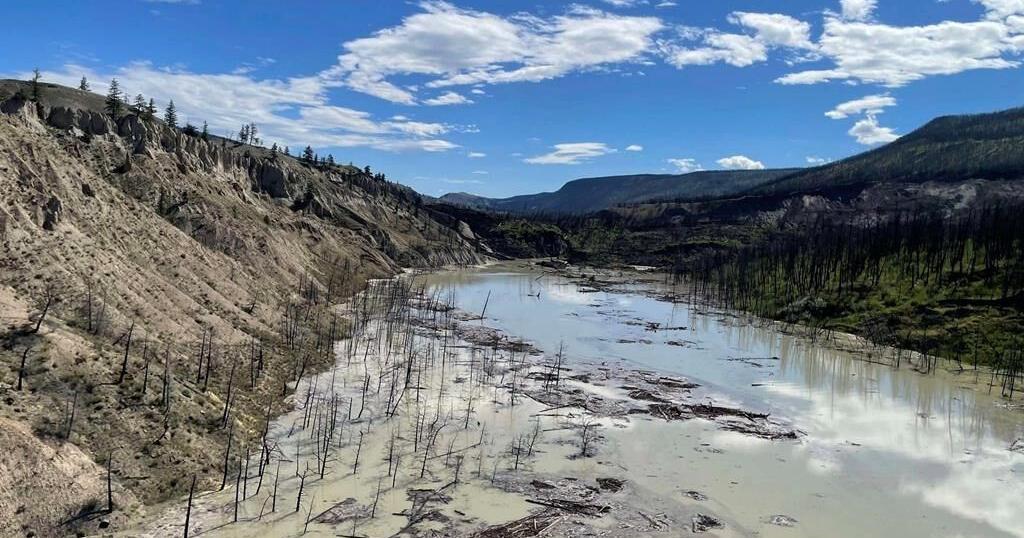VANCOUVER – An expert on British Columbia’s salmon populations says the massive landslide that blocked off part of Canada’s largest sockeye salmon run has created an unprecedented situation potentially putting the already struggling fish at even more risk.
Scott Hinch, the associate dean at the University of British Columbia’s Pacific Salmon Ecology and Conservation Laboratory, said the debris piled 30 metres high and 600 metres long blocking the Chilcotin River could cause problems for chinook and sockeye populations both while the water is being held back, and when it eventually bursts free.
“These are natural events, but what’s unusual about this event is it’s occurring at a time when the rivers are way warmer than they used to be,” he said in an interview Thursday.
“And that creates this unprecedented lack of understanding of what’s going to happen to these fish.”
The sockeye are on their way to Chilko Lake, where they will spawn. But to get there, they have to get through Farwell Canyon, close to where the dam of rock and mud is in the way.
“They would be starting to trickle through naturally now and then in about a week and a half, 10 days or so, the peak of that run will be into the Chilcotin,” he said.
“They’re coming up the Fraser right now, these fish.”
The Chilcotin is a tributary of the Fraser River and officials with the province and Cariboo Regional District say it’s uncertain if the lake building behind the dam will burst or if it will top over the debris. The B.C. government said a release could swell the Fraser River for hundreds of kilometres, potentially setting off dozens of emergency evacuations and alerts.
Hinch said the warmer Fraser River is already nearly lethal for the salmon, and if the fish get held back from entering cooler glacier-fed waters, that could be dangerous.
“So, what’s happening right now is, with the reduced water flow downstream, that water is going to be warmer as a start. It’s also going to possibly be less accessible. So, these fish are going to be holding in warmer water and low flows, either in the Chilcotin system or in the Fraser system, he said.
Williams Lake First Nation Chief Willie Sellars said the situation with the salmon run is “incredibly concerning.”
He said the First Nation is worried about what will happen to the fish after the large lake pooling behind the landslide breaks loose.
“What is that going to do to every single one of those sockeye and chinook that are swimming up the Fraser River looking to spawn in those other tributaries?” he said.
Hinch said one of the problems is that there’s no way to know how the debris sent flowing down the rivers will eventually settle.
“If not full barriers, it could create partial barriers, it could create areas where it’s more difficult for the fish to get around,” Hinch said.
“Keep in mind that these fish have all stopped feeding about a month ago. And so, they’re migrating up on reserves.”
There’s also a risk that new rock and debris in the water could affect the salmon’s ability to navigate using their sense of smell, a skill imprinted on them as fry.
“They are imprinted on unique chemicals that are in their home watershed. That chemical composition is disrupted by landslides, because you now have other organic chemicals coming into the river, at high concentrations, that aren’t part of their home stream smell,” he said.
Sellars said this year was already anticipated to be a low run year.
“Maybe it’s better that something like this happened on the low year, but then it’s also pretty devastating to that run that’s going to be heading up the Chilcotin and four years from now, there is going to be no fish,” he said.
At a news conference Thursday, Nathan Cullen, the minister of water, land and resource stewardship, said the government knows that the water is critical spawning habitat for salmon and other fish and that the sockeye are on their way.
He said the government was “initiating early plans as to what we can do to make sure that those stocks remain intact.”
Hinch said there’s not much that can be done prior to the dam breaking.
“All we can do is hope that the temperatures that these fish are holding in isn’t doing irreparable damage to them for too long of a period of time. And that the fish get into the Chilcotin once the river is amenable for migration.”
In 2019, a landslide partially blocked the Fraser River and created an impassable barrier to key salmon populations that spawn in the Upper Fraser watershed.
Rescue efforts to get the trapped salmon beyond that slide included shooting them through a so-called salmon cannon, capturing the salmon, then transporting them on a truck or helicopter past the site and finally creating a permanent fishway to help them get past the slide.
This report by The Canadian Press was first published Aug. 2, 2024.
